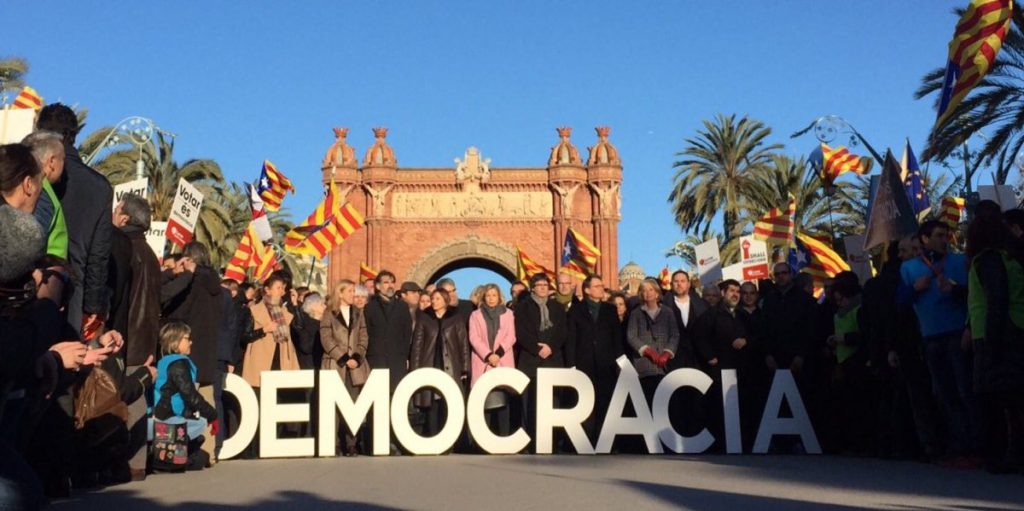06.02.2017 - 20:08
The main Catalan pro-independence associations have mobilised more than 40,000 people this Monday to show their support for former Catalan President, Artur Mas, who faces trial for allowing the 9-N symbolic vote on independence in 2014. According to Mas, the summonsing, which also affects former Catalan Ministers Irene Rigau and Joana Ortega is “a political trial that has very little foundation in law” and is therefore regarded as an attack against Catalonia’s pro-independence aspirations and against the citizens’ right to decide.
The Public Prosecutor wants Mas to be banned from public office for 10 years and claims that the former Catalan President, Ortega and Rigau “were fully aware” that by preparing the non-binding consultation “they were breaking the mandatory rulings of the Spanish Constitutional Court”.
Before entering Barcelona’s High Court, the three accused greeted the crowd, which displayed banners with the motto ‘”We are all 9-N”. Mas, Rigau and Ortega arrived at the court on foot and were joined by Catalan President, Carles Puigdemont, the Parliament’s President, Carme Forcadell, the Catalan executive and representatives from the previous Government, as well as members of those parties which openly supported the 9N.
Mas before the court
The 9-N symbolic vote on independence, which took place in 2014 and registered a turnout of more than 2.3 million people, was “the consequence of wide parliamentary agreements and explicit and reiterated mandates of the Chamber” rather than “a personal whim”. This is what former Catalan President, Artur Mas, testified before the court this Monday when accused of alleged disobedience and breach of trust when allowing the non-binding consultation.
Catalan vice-president, Joana Ortega and former Catalan Minister for Education, Irene Rigau will also have to declare before the judge for the same crimes and may face a 10-year ban from public office if convicted. Mas attributed the political responsibility for the 9-N to himself and insisted that the symbolic vote took place “after democratic elections which nobody refuted nor questioned”.
Mas, who refused the answer the Public Prosecutor and the Popular Accusation, explained that the 9-N was “unstoppable” since it was at the hands of volunteers rather than under the Government’s charge. According to Mas, during the 15 days prior to the symbolic vote many important decisions were made to ensure the volunteers’ access to the “logistics” and guarantee the consultation’s success.
The former Catalan President stated that the Spanish Constitutional Court (TC) didn’t warn of any legal consequences for promoting a participative process, like the State’s Attorney ordered. Moreover, he insisted that the TC didn’t make any clarification on this matter, despite of the Government’s repeated demands.
Institutional speech by Puigdemont
The day started with an institutional message from President Puigdemont, who received the three summonsed this morning at ‘Palau de la Generalitat’, the Catalan Government’s headquarters. “On the 9-N, 2.3 million people expressed their opinion on the relationship between Catalonia and Spain in a consultation which responded to the compromise between citizens and their representatives”, he stated. “Many of us feel tried today and thus we will show our outrage for what we consider a political trial”
“The 9-N [symbolic vote on independence] was one of the many messages that Catalonia has sent in the last decade. It was a joyful day with a strong democratic component, and which was full of hope”, emphasised Puigdemont and assured that “a country which is able to hold a consultation such as the 9-N has a healthier democracy than that of a country which puts on trial those who made it possible”.
Video: https://www.youtube.com/watch?time_continue=5&v=KBIK4cMc1jo

